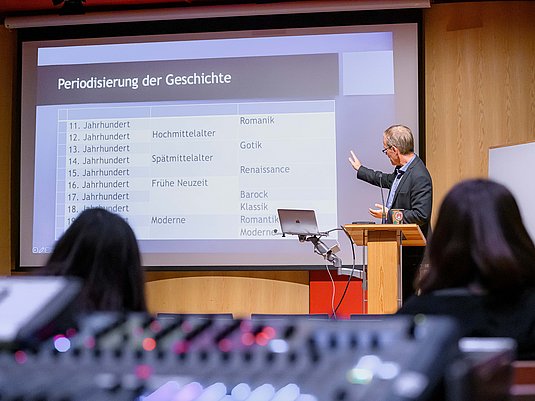Musicology
Interdisciplinary basic subject
In research and teaching, musicology at the Cologne University of Music and Dance covers the entire spectrum of current music research. In addition to a focus on historical musicology, which is represented at the university by its own Institutefor Historical Musicology, great importance is attached to popular music research, sound studies approaches influenced by media culture studies and artistic research perspectives. The continuous development of comprehensive skills in the field of research methodology and knowledge communication accompanies the entire course.
The Master of Arts in Musicology deals with the research, analysis and reflection of music and sound in all their historical, aesthetic, cultural and media manifestations. At the university, musicology is a cross-curricular basic subject for all represented degree programs - and as such an integral part of the creative teaching and learning environment. As an independent degree course, it can be studied with various specializations and subsequently as a doctoral course.
The elective area "Artistic Research" is unique in Germany and enables students with an artistic degree to enter the innovative field of "Artistic Research"; alternatively, the research module "Musicological Research" can be chosen. Students in the "Artistic Research" elective area have the opportunity to receive individual tuition in their chosen main artistic subject.
Teaching
Full-time lecturers
- Prof. Dr. Arnold Jacobshagen
- Prof. Dr. Sabine Meine
- Prof. Dr. Michael Rappe
- Junior Prof. Dr. Anna Schürmer
Lecturers
Documents & Downloads
Historical musicology
Historical musicology deals with the history of music as a whole. The focus is traditionally on European music cultures from antiquity to the present day. While the subject was initially primarily philological and biographical, its range of methods has recently been significantly expanded to include cultural studies issues. New perspectives, for example from gender research, the history of mentalities, intercultural research, postcolonial studies and media studies, contribute to a comprehensive historical understanding and question the historical consciousness of the present. At the same time, historical musicology is based on basic musical subjects such as harmony, form theory and composition as well as notation, source studies, performance practice and other historical auxiliary sciences.
Systematic Musicology / Sound Studies
Systematic musicology is an interdisciplinary field of research that is as theoretically-discursive as it is experientially-practical. At the HfMT, systematic musicology is profiled in the field of sound studies - sound research situated between music and media cultural studies, which focuses on technical-material operations and aesthetic-epistemological discourses rather than the content of the media itself. In intradisciplinary dialog, but also in interdisciplinary exchange, sound studies reflects in particular on auditory media cultures: from new forms of reception (mobile listening, technologies of non-listening), to digital and platform-supported production (sampling, digital audio workstations, etc.) and reproduction (streaming, remote technologies, etc.), to augmented and virtual realities (ludomusicology, etc.) as well as artificial and artistic intelligences (machine listening, generative music, etc.).
History and theory of popular music
The history and theory of popular music aims to understand popular music: its techniques and technologies, its virtuosity, aesthetic differentiation and its mode of action in the context of its social use. The starting point for a theoretical examination is usually the description and analysis of concrete phenomena. Such an investigation is not reduced to the level of musical material. Rather, it is extended by media-specific aspects such as audiovisuality, staging and performance, but also by various (meta-)discourses on popular music in the pop feuilleton and in literature, and is further contextualized on the basis of the approaches to cultural analysis developed in English and American cultural studies.
Artistic research
Artistic research is an interdisciplinary field between art and science that enables a deeper understanding of how art or music creates knowledge. Depending on the focus of this multi-layered and dynamic field of research, it is about the scientific fertilization of aesthetic procedures or the artistic negotiation of discursive processes. The HfMT Cologne focuses on Artistic Research - represented by the interdisciplinary Center for Artistic Research and Digital Innovation (ZKD). Unique in Germany is the elective area "Artistic Research" in the Master of Musicology, which enables students with an artistic degree to enter this innovative field of research.

MuWi-Cast
The MuWi-Cast sees itself as an academic podcast that illuminates central topics of music research in auditory form. Special attention is paid to the research field of music and media: while the theoretical reflections focus on the discourse fields of sound studies, an alternative form of publication is tested in media practice through the practice of podcasting - musicological reflection translated into sound.
- The podcast episodes can be found on the following page.
- Management and contact: Junior Professor Dr. Anna Schürmer

GfM Annual Conference 2024
The Society for Music Research invites you to Cologne! Together with the University of Cologne, the Cologne University of Music and Dance is organizing the GfM Annual Conference 2024 from 11 - 14 September on the topic of COLLABORATIONS ∞ Against Methodological Compulsion. The topics of the two main symposia are also interdisciplinary and cross-methodological: the HfMT will be looking for "Musical Perspectives in Artistic Research": Acoustic Research. In contrast, the University of Cologne will focus on "Transdisciplinary approaches between historical and systematic methods" - on musical experience. In addition, there will be free papers and panels from the broad spectrum of current music research.


|
arnold.jacobshagen@hfmt-koeln.de |
|
| Telephone |
+49 / (0)221 / 28380 - 362 |
| Address |
Hochschule für Musik und Tanz Köln Unter Krahnenbäumen 87 50668 Köln |